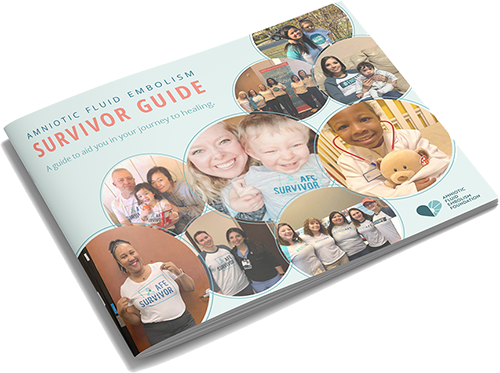Inside the Survivor’s Guide
Requesting and Reading Your Medical Records
Your Guide to Understanding and Accessing Your Medical Records
Reading your medical records can help you understand what happened and aid in your follow-up health care. Below are the most asked questions about how to obtain and read your medical records.

Why should I request my medical records
An important step in the healing process is to better understand what happened to you. Many who experience an AFE have limited or no memory of the event. This can lead to confusion about your physical health and ability to advocate for future healthcare needs.
Many survivors are frustrated by relying on others to help explain what happened to them. Oftentimes, those same people are triggered by such a traumatic event. They may want to avoid the topic, don’t remember everything, or are afraid to tell you such difficult memories.
Reading your medical records can assist you with insight into what happened, and may aid in your follow-up health care.
When should I request my medical records?
We recommend requesting your records around 15- 30 days after you were discharged.
How do I request my medical records?
To obtain your records you must complete a Release of Health Information form from your specific hospital(s). The form is usually available on the hospital’s website under “patient” or “medical records”. You may call the main hospital phone number and ask to be connected with the medical records department. Once you complete the form you can send it back by mail, email, or fax. If you were treated in multiple hospitals, you will need to request records from each separate hospital. Some hospitals outsource their medical records to a company that specializes in document storage. If that is the case, you will deal directly with the vendor rather than the hospital.
Is there a cost to getting my medical records?
Most hospitals or record storage companies will charge a fee. It can be a flat fee or per page. Flat fee charges may differ depending on how the records are sent. Usually, email is the least expensive. However, you may have too many pages of records for them to be emailed. Hospitals typically do not charge if the records are being used for your follow up care. You may ask your healthcare provider to request a copy and ask them to give it to you. Or, you may negotiate fees with the hospital or medical records’ services. Your records may also be available in your digital platform account (for example, mychart).
Where should I store my medical records?
Paper records should be stored in a box or binder for future reference. Electronic records should be stored on a thumb drive or separate hard drive. We recommend storing electronic copies in 2 places to protect against accidental deletion.
Where should I start when reading my medical records?
One of the best ways to begin to read your records is to organize them by grouping them into categories. These can be progress notes, operative reports, lab results, imaging reports, etc. Then, put those groupings into date order. We recommend reading the progress notes and operative reports first. If you received CPR there will likely be a “code blue record” or “code blue sheet” or sometimes the information may be included in the anesthesia record.
How long will hospitals keep my medical records?
Hospitals are only required to keep records for a specific amount of time. Most often it is between 5-10 years, although the requirements differ from state to state, or country.
Should I get a full copy of my medical records?
You usually have the option to get a full copy or a summary copy of your hospital stay. A summary copy is usually sufficient in assisting you with understanding the over course of your care. Summary copies typically include healthcare provider notes, operative reports, consult notes, health history, test results, and the discharge summary. A summary copy reduces the total number of pages of your records.
In some cases, you may want to have a full and complete set of records. Full records usually include: lab values, blood transfusions records, medications, measurements of fluids, and heart rate strips.
Inside the Guide
Help us #endAFE!
The AFE Foundation is funded by donations. Every dollar goes toward our support, research, and education programs. We are committed to turning donations into action, including yours.
